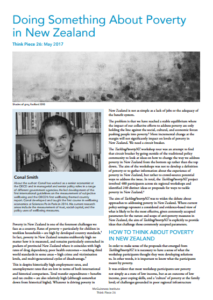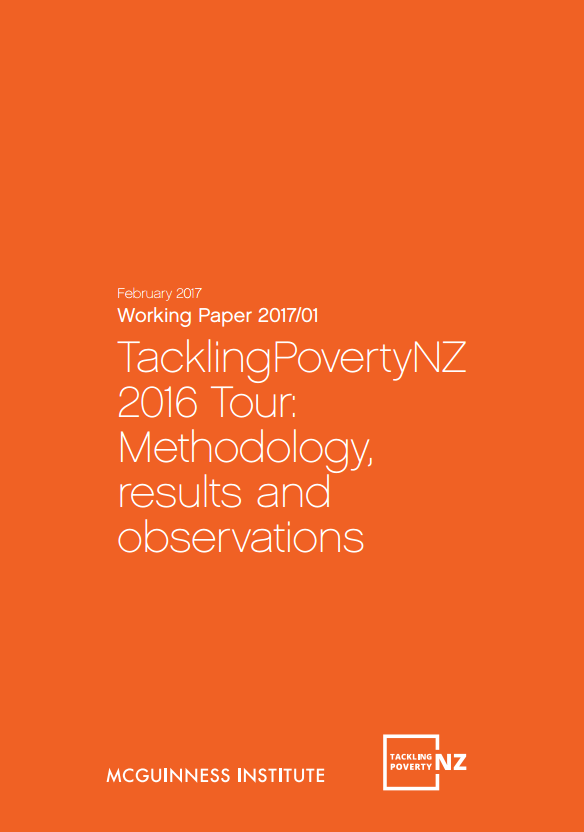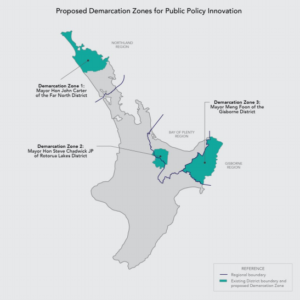Earlier this year the McGuinness Institute engaged Conal Smith to prepare an independent reflection on the 2016 TacklingPovertyNZ regional workshops. We are now pleased to announce the publication of Think Piece 26 – Doing Something About Poverty in New Zealand. The think piece discusses what can be done to address poverty in New Zealand through seven bold proposals that Conal puts forward as worthy of investigation. The seven proposals reflect themes or suggestions that were repeated across the workshops, and which, if implemented, would represent a significant change in how New Zealand addresses poverty.
 These are to:
These are to:
- simplify and standardise the benefit system,
- introduce special demarcation zones in regions of high need,
- revisit the role of the State as employer of last resort,
- apply a social investment approach to investment in ‘hard’ regional infrastructure,
- invest significantly in mental health,
- target the behavioural drivers of poverty, and
- introduce asset-based assistance for high-risk children.
Conal discusses how New Zealand primarily needs to change the way it thinks and talks about poverty before it can look to make incremental change. For Conal, it is evident from the outcomes of the workshops that participants saw ‘poverty not simply as a state of low income, but as an outcome of low income, poor coping skills, and a “culture” of poverty at the family level; of challenges grounded in poor regional infrastructure and opportunities; and problems in resource allocation at the national level.’
Conal has worked as a senior economist at the OECD in managerial and senior policy roles in a range of different governmental agencies. He led development of the first international guidelines on the measurement of subjective wellbeing and the OECD’s first wellbeing themed country report. Conal developed and taught the first course in wellbeing economics at Sciences Po in Paris in 2014. His current research areas include the measurement of trust, social capital, and the policy uses of wellbeing measures. Conal plans to publish an academic article for Policy Quarterly later in the year to further discuss tackling poverty in New Zealand.
About the TacklingPovertyNZ 2016 workshops
The 2016 tour was a response to a 2015 three-day workshop that brought together 36 participants aged 18 to 25 representing a diverse range of backgrounds from throughout New Zealand. Participants found that ‘assuming that one solution will work everyone indicates a failure to address cultural disparities and injustices, and an ignorance of the diversity of our population’. The purpose of the 2016 tour was to build and share ideas on how to tackle poverty, come up with local solutions and connect like-minded people within communities.
The Institute organised six workshops throughout New Zealand in Queenstown, Manawatu, Rotorua, Gisborne, Kaikohe and Kaitaia. Working Paper 2017/01 – Tackling PovertyNZ Tour: Methodology, results and observations brings together the outputs from the six workshops and aims to illustrate the diverse range of challenges and opportunities existing in communities.
Proposal to the Prime Minister on Demarcation Zones for Public Policy Innovation The second proposal in the think piece draws on the work we did at the end of 2016 in the Proposal to the Prime Minister on Demarcation Zones for Public Policy Innovation.
The second proposal in the think piece draws on the work we did at the end of 2016 in the Proposal to the Prime Minister on Demarcation Zones for Public Policy Innovation.
Published in December 2016, the proposal is a response to the entrenched forms of poverty we found on the TacklingPovertyNZ tour. The demarcation zones are instruments of public policy that aim to tackle poverty and build economic wealth in three zones. See the proposed zones in the image on the right.
We consider Meng Foon, Hon John Carter and Hon Steve Chadwick JP, mayors in Gisborne, the Far North and Rotorua respectively, to be well placed to lead the three proposed demarcation zones. Each area would develop its own ways of moving forward.
In 2017 we would like to continue to build on these findings. There was a lot to learn and digest, and we are still working through what this means in terms of public policy.
